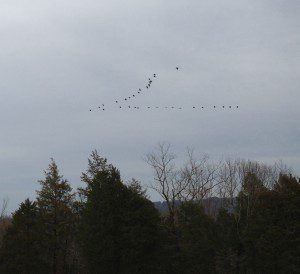Theology is a speculative process. Pagan, Christian, Buddhist, or any other flavor – the study of God or Goddess or gods and goddesses is inherently subjective. Though we can and should approach this topic with all the reason and logic at our command, the kind of experimentation we find in other fields of study is rarely possible.
Still, theology and similar practitioner-focused religious studies are helpful. They help us form a framework for our beliefs and practices. That framework in turn gives us a language for describing our religious experiences. It helps us interpret our experiences in light of the experiences of others in our tradition who time has shown to be reliable and helpful. It means we don’t all have to re-invent the religious wheel for ourselves.
Because theology is a speculative process dealing with highly subjective topics, we have great leeway in how we choose to construct our religious frameworks. We do not, however, have the leeway to construct a religious framework that violates the laws of Nature or contradicts established facts, and we should take great care in constructing a framework that contradicts the consensus of science, history or other academic disciplines.
[I’m aware that “consensus” doesn’t mean “proof” and that scientific and historical consensus has been wrong before. I’m saying if you want to go against it you’d better have a stronger reason than “the consensus goes against my religion.”]
Most Pagans understand this. Most Pagans have a respect for science, if not an outright love for it. Most Pagans understand the difference between mythology and history. Most.
I bring all this up because recently I’ve found myself getting hit from both sides of this situation. Not hit hard and certainly not attacked, but on one hand I’ve come across people under the “Pagan umbrella” who are reading myth as history. In one case their reading is possible but unlikely; in another it goes against scientific and historical consensus.
Now, I see no harm in acting as if the gods of our ancestors actually did what the storytellers say they did or in acting as if the heroes of our ancestors were historical people who actually did the mighty deeds they’re credited with doing. I think we can get the full benefit of the stories by reading them mythically, but if reading them historically helps you better connect to the stories and the people and gods in them, have at it.
The danger is that in doing so, you can build up a theological house of cards, with one premise after another based on a historical reading of myth. Then if you come to the point where the historicity of a myth is clearly shown to be untrue, you find your whole religion crumbling out from under you. This is why fundamentalist Christians fight so hard against the established truth of evolution – if there is no historical Adam and Eve, there is no Original Sin and their salvation narrative goes out the window.
The other danger is that reading a myth historically limits the story to a single place and time. A myth, though, conveys timeless truths. Its value isn’t as a report of something that happened, but as a vehicle for teaching us who we are, whose we are, where we came from, where we’re going, and what we’re going to do when we get there. It tells us what’s important and how we should live. If we’re focused on “just the facts” we’ll miss a lot of Truth.
On the other hand I’ve had well-meaning people ask “how can you believe in gods and magic?” What most of them really mean is “how can you believe in a god who isn’t my god?” To them I’ll just say the world as we experience it is much more easily explained by many gods of limited power than by one god of unlimited power. The difference in an atheist and a monotheist is that the monotheist disbelieves in a million gods and the atheist disbelieves in a million and one – be aware of your cultural assumptions.
 Almost all of us have religious experiences. Some are small and some are large; most are so fleeting we either don’t recognize them for what they are or we try cling to them long after they’ve past. But we do have them: moments of wonder and awe and of clarity and lucidity, transcendent moments where time and space seem to meld together, prophetic dreams, signs and omens, and that movement of Spirit (or spirits) that catches us at just the right time.
Almost all of us have religious experiences. Some are small and some are large; most are so fleeting we either don’t recognize them for what they are or we try cling to them long after they’ve past. But we do have them: moments of wonder and awe and of clarity and lucidity, transcendent moments where time and space seem to meld together, prophetic dreams, signs and omens, and that movement of Spirit (or spirits) that catches us at just the right time.
If you take off the blinders of orthodox monotheism on one side and of scientific materialism on the other you’ll see there are many ways to interpret those experiences. Which one is right? A few are demonstrably false, but most can neither be confirmed nor rejected. A better question is which one is meaningful and helpful to you? Which one gives you strength? Which one encourages you to work toward a better world here and now? Which helps you take care of yourself and your family? Which one helps you deal with the human predicament of understanding you’re alive but knowing some day you will die?
If you find a traditional Christian interpretation most helpful, fine. Loving your god with all your heart and loving your neighbor as yourself is a great way to go through life.
If you find a strictly Naturalistic interpretation most helpful, fine. The world needs more rational thinking and the Universe is pretty amazing even if the physical world is all there is.
As for me, I go where the evidence leads. I can’t believe things that violate the laws of Nature, and I give great credence to scientific and historical consensus – these are some of my boundaries. If the evidence is inconclusive – and in the case of religious matters it almost always is – then I follow my heart. And I do a lot more good as a committed Pagan than I ever did as an unenthusiastic Christian. If you want to know specifically what that means, I wrote about it in some detail last year.
I continue to build a theological framework to better understand my religious experiences and to better relate to my goddesses and gods and to their realm. I hope you will too.
I know I promised to write on liminal zones next, but this jumped ahead of it. Liminal zones are still on the “to be blogged” list and I will address them at some point in the not-too-distant future.















